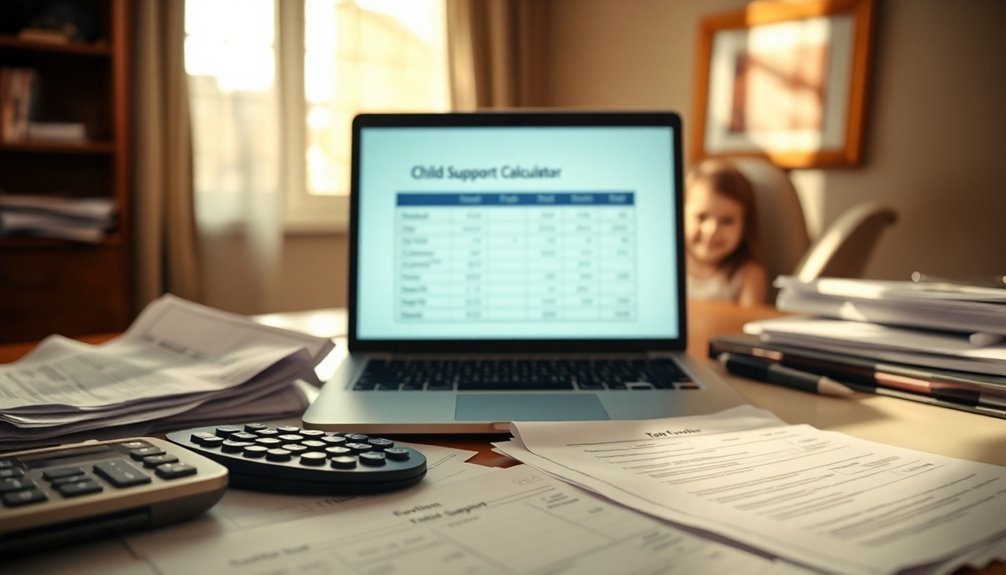Yes, child support can impact your taxes, especially if you have overdue payments. If you fall behind, child support agencies can intercept your federal tax refund to cover your arrears. This means you may not see that refund if you owe money. Keep in mind that child support payments aren't tax-deductible for you and aren't considered taxable income for the recipient. Also, whether you can claim your child as a dependent can influence your tax benefits. Understanding these details can help you better manage your obligations and avoid unexpected financial hits. There's more to explore about your responsibilities and options.
Key Takeaways
- Child support agencies can intercept federal tax refunds to collect overdue child support payments.
- If child support obligations are unmet, tax refunds may be withheld regardless of payment history.
- Notice is typically provided before interception, which may cause financial strain.
- Compliance with child support orders helps prevent legal complications and potential refund interception.
- Understanding your child support obligations is crucial to manage taxes effectively and avoid penalties.
Child Support and Taxes Overview

What do you need to know about the relationship between child support and taxes? First, understand that child support payments aren't considered taxable income for the recipient. This means you don't need to include these payments in your gross income, making child support a "tax neutral" personal expense. Consequently, receiving child support doesn't affect your requirement to file a tax return or your eligibility for the Earned Income Tax Credit (EITC).
On the flip side, if you're the one making the payments, you can't claim child support as a tax deduction. Since these payments fall under personal expenses, they aren't eligible for tax deduction, and your income used for child support remains taxable. Additionally, it's important to note that child support payments do not influence your taxable income calculations.
When it comes to claiming your child as a dependent, only one parent can do this each year, usually the custodial parent. However, agreements may allow the noncustodial parent to claim the child in alternating years. Claiming a dependent can open doors to tax credits, like the Child and Dependent Care Tax Credit, and can help you qualify for the Head of Household filing status.
Tax Implications for Payments

Child support payments carry important tax implications for the paying party.
First and foremost, you can't deduct these payments from your taxes. They're treated as personal expenses, much like your costs for food and clothing. This means they won't lower your taxable income, and you won't get any tax benefits from making these payments. Your income, which you use to pay child support, is still taxed normally.
Additionally, just because you pay child support doesn't mean you can claim the child as a dependent. The right to claim a child typically depends on your divorce order or custody agreement. Claiming a child as a dependent could open doors to other tax benefits, like the Child Tax Credit or the Head of Household filing status, but only one parent can claim this benefit. It's also important to note that child support payments do not affect eligibility for the Earned Income Credit for the receiving parent.
Lastly, if you owe back child support, the Department of Revenue might intercept your tax return to cover that amount. This can also impact your spouse's portion of the return unless you file an Injured Spouse Claim.
To avoid any issues, ensure all your child support payments are current.
Back Child Support Consequences

Failure to comply with child support obligations can lead to significant consequences that affect both your finances and legal standing.
If you fall behind, wage garnishment may kick in, automatically deducting payments from your paycheck. Your tax refunds could be withheld to cover the unpaid amount, and your driver's or professional licenses might face suspension. Additionally, the government can revoke or suspend your passport, limiting your travel options.
Legally, you could face contempt of court proceedings, which might include fines beyond the original support order. In severe cases, you could even face jail time until you comply. You'll likely need to appear in court to explain your lack of payment, adding to your stress.
Financially, unpaid child support accrues penalties and interest, leading to levies on your bank accounts or liens on your property. It's important to remember that federal intervention may occur if the payments are overdue beyond two years, which can complicate your situation further.
If you owe over $150, your social security benefits could be withheld, and a percentage of your retirement funds may be deducted. The federal government may intervene if the debt extends beyond two years, leading to possible interception of your tax returns, making it crucial to stay current on your obligations.
Dependents and Tax Credits

Navigating the complexities of child support obligations often leads parents to consider how dependents affect their tax situation. If you want to claim your child as a dependent, remember that your child mustn't provide more than half of their own support for the year and must live with you for more than half the year.
The non-custodial parent can claim the child under certain conditions, particularly if you release the exemption using IRS Form 8332.
The Child Tax Credit can significantly impact your tax bill, reducing it by up to $2,000 per qualifying child. However, only the parent claiming the child as a dependent can access this credit, which comes with income limits of $200,000 for single filers and $400,000 for joint filers. Additionally, it is important to understand that child support is not considered taxable income, ensuring that it remains solely for the child's benefit.
It's essential to note that child support payments don't affect the Child Tax Credit, as they're not taxable or deductible.
If you and the other parent agree, you can alternate years in claiming the child for tax purposes, which may influence who benefits from tax credits. Consulting a tax professional can help you maximize these benefits based on your unique situation.
Calculating Income for Support

When calculating child support, understanding income sources is crucial. Your gross income includes money from all sources, so it's essential to factor in wages, salaries, self-employment earnings, commissions, and bonuses.
Don't forget about investment income, dividends, and interest you might earn. Government benefits like unemployment or social security can also contribute to your gross income.
To arrive at the net income for child support calculations, you'll need to adjust your gross income. This means deducting certain expenses such as taxes, health insurance, mandatory union dues, and retirement contributions.
In some cases, alimony payments can be deducted too. Moreover, extraordinary expenses like child care or medical costs may also play a role in the calculations. Additionally, the Income Shares Model is commonly used to determine how much of each parent's income should contribute to child-rearing costs.
Legal Obligations and Compliance

Understanding your income and its implications for child support is just the beginning; you also need to be aware of your legal obligations and compliance requirements.
Child support payments aren't taxable income for the receiving parent, meaning they won't report these payments on their tax returns. On the other hand, if you're the paying parent, you can't deduct child support from your taxes—it's considered a personal expense. However, if you're late on payments, be cautious; interest on overdue child support is taxable and must be reported as income. Your tax filing status remains unaffected by child support payments, as that's determined by marital status and other factors. Additionally, all U.S. states have guidelines for calculating child support, which can vary based on specific circumstances of each case.
If you're the custodial parent, you might be able to negotiate with the non-custodial parent about claiming your child as a dependent. This can impact tax benefits and credits significantly.
Child support agencies can enforce obligations, using methods like intercepting federal tax refunds for overdue payments. Staying compliant with these rules is vital to avoid penalties and ensure you're fulfilling your legal responsibilities.
Frequently Asked Questions
Can I Modify Child Support Payments Based on Income Changes?
Yes, you can modify child support payments based on income changes.
If you experience a significant increase or decrease in your income—like a 20% drop in Nevada or a 15% drop in New York—you can request a modification.
Additionally, if there's a change in custody or substantial changes in your financial situation, you may also qualify.
Just remember, you'll need to provide financial documentation to support your request.
How Does Child Support Impact My State Tax Return?
Child support doesn't directly impact your state tax return since the payments aren't tax-deductible for you.
While you can't claim these payments, the recipient also doesn't report them as income.
However, if you owe back child support, your state tax refund might get intercepted to cover those debts.
You should be aware of this potential offset when filing your taxes.
Always check with your tax professional for personalized advice.
What Happens if I Overpay Child Support?
If you overpay child support, you might be able to recover those funds, but the process can be complex.
You'll need to file a motion in court and provide proof of the overpayment.
If there are no arrears, you may get reimbursed or apply the overpaid amount to future payments.
However, legal advice is often necessary, as court outcomes can vary based on your specific circumstances and state laws.
Can I Claim Child Support Payments in Bankruptcy?
You can't claim child support payments in bankruptcy.
These obligations are considered non-dischargeable debts, meaning you must continue to pay them even during bankruptcy proceedings.
Filing for bankruptcy doesn't eliminate your responsibility to make child support payments.
If your financial situation changes, you might be able to request a modification, but your child support obligations remain a priority, so you'll need to keep making those payments.
Will Child Support Affect My Eligibility for Federal Benefits?
Child support can definitely affect your eligibility for federal benefits like SSI and Medicaid.
When calculating SSI, child support counts as unearned income, potentially reducing your benefits. If your child support pushes your income over Medicaid limits, it could impact your eligibility too.
However, some states have programs that help you maintain Medicaid even if you lose SSI.
It's wise to consult a caseworker to navigate these complexities and protect your benefits.
Conclusion
In summary, understanding how child support affects your taxes is crucial. Child support payments typically aren't taxable, but unpaid amounts can lead to tax consequences. If you're claiming dependents, ensure you're aware of the related tax credits. Always calculate your income accurately for support obligations, and stay compliant with legal requirements. By staying informed, you can navigate these financial responsibilities more effectively and avoid any surprises come tax season.









